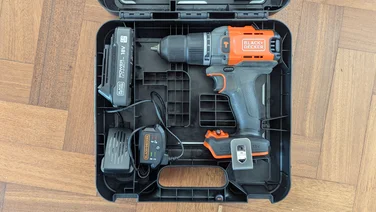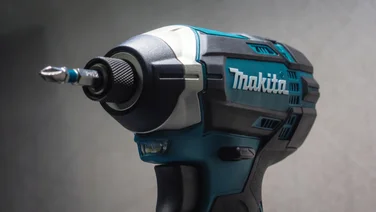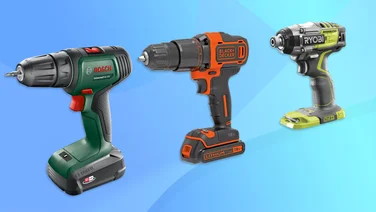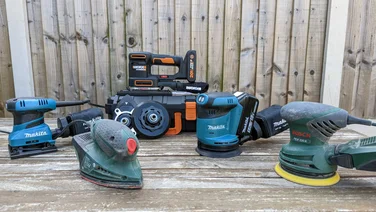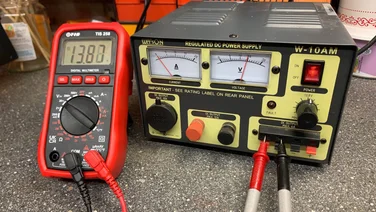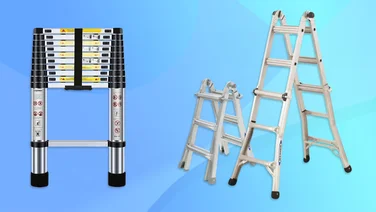To help us provide you with free impartial advice, we may earn a commission if you buy through links on our site. Learn more
- Best stud finders: At a glance
- The best stud finders to buy in 2024
- 1. Bosch Professional Stud Finder: Best all-round stud finder
- 2. FOLAI Stud Finder Wall Scanner 4 in 1: Best value electronic stud finder
- 3. StudBuddy Magnetic Stud Finder: Best simple stud finder
- 4. Franklin Sensors ProSensor M70 Professional Stud Finder: Best multi-sensor stud finder
- 5. CH Hanson Stud 4 Sure Magnetic Stud Finder: Best magnetic stud finder
- 6. Bosch Truvo Electrical Detector: Best for live wire and metal-only detection
- How to choose the best stud finder for you

As well as detecting the studs inside walls, the best stud finders can detect live wires, electrical ducting and metal or even plastic pipes too. This makes a good stud finder an essential for carrying out safe and well-executed DIY jobs.
All six stud finders in this round-up have been selected after a thorough research process involving careful analysis of everything from manufacturers’ websites to datasheets and user reviews. After assessing key features such as detection depth, size and weight, we whittled down our favourites and made sure to cover a range of budgets and requirements.
At the bottom of this page, you can find our buying guide which covers key information and questions you’ll need to ask to help narrow down your choices. However, if you already have a clear idea of what you’re after, feel free to jump straight ahead to our selection of the best stud finders for you.
Best stud finders: At a glance
| Best stud finder | Bosch Professional Stud Finder (~£113) | |
| Best value stud finder | FOLAI Stud Finder Wall Scanner 4-in-1 (~£21) | |
| Best simple stud finder: | StudBuddy Magnetic Stud Finder (~£13) |
The best stud finders to buy in 2024
1. Bosch Professional Stud Finder: Best all-round stud finder

Price when reviewed: £113 | Check price at Amazon
- Great for… user-friendly, fully featured unit
- Not so great for… those on a budget
Bosch’s Professional Stud Finder is far from the cheapest, but if you’re looking for a fully featured unit that you’re going to use frequently, it’s the one to have. It also comes with a wrist strap and a drill marker, plus a protective case, even though it has an IP54 dust protection rating.
Despite its professional label, it’s straightforward to use even for an amateur, with modes to detect metal – magnetic and non-magnetic – live wires, and those all-important studs behind drywalls. It has a three-colour display that illuminates green when nothing has been detected, yellow when you’re close to a target, and red when it’s detected something. There’s even an indicator to show when you’re at the centre of the target, while a hole in the unit allows you to mark the drill hole using the tool supplied.
Key specs – Stud scan depth: 38mm; AC scan depth: 50mm; Metallic scan depth: 120mm; Non-metallic scan depth: 80mm; Stud centre locator: Yes
2. FOLAI Stud Finder Wall Scanner 4 in 1: Best value electronic stud finder

Price when reviewed: £21 | Check price at Amazon
- Great for… five different modes, value for money
- Not so great for… only 60mm of metallic scan depth
If you want a multifunctional stud finder that won’t break the bank, this is the one for you. The FOLAI sits nicely in the hand, making it easy to scan your stud walls, but what we liked most was the LED screen which was informative and pretty intuitive to operate.
The FOLAI has five different modes: three for scanning for studs, one for detecting metal pipes and one for live wires. Each of these is represented by an icon beneath the screen, making it easy to see which mode you are working with at any given time. Switching between modes and starting a scan is also easy, with two well-signposted buttons at your fingertips.
When looking for studs, arrows indicate the direction to move the detector then, as you get near, the display shows how close you are by adding new bars until it’s filled. This, combined with a high-pitched beep, signals that you’re at the centre of a stud and the same applies when detecting live wires and metal pipes.
Key specs – Stud scan depth: 38mm; AC scan depth: 51mm; Metallic scan depth: 60mm; Stud centre locator: Yes
3. StudBuddy Magnetic Stud Finder: Best simple stud finder

Price when reviewed: £13 | Check price at Amazon
- Great for… affordable, portable
- Not so great for… only works on plasterboard, relies on magnets alone
StudBuddy claims its product is the world’s simplest stud finder. And, at just £12, it’s quite possibly the cheapest, too. But there are some things to bear in mind when you consider its simplicity. First, it’s designed to work on plasterboard – not plastered walls or on lath and plaster – which could limit its usefulness, particularly in older UK homes. Second, it relies on magnets to hunt down nails or screws in studs, rather than any electrical capacitance, which means you need to take extra care to be sure it’s finding a nail and not a metal pipe.
But if you can work with that, the StudBuddy is well worth having in your tool box. It’s about the size of a marker pen and doesn’t require batteries. It magnetises itself to the wall when a stud is detected and will hang there like a plumb bob for ease of marking. There’s also the more expensive StudBuddy Plus, which incorporates vertical and horizontal spirit levels.
Key specs – Stud scan depth: N/A; AC scan depth: N/A; Metallic scan depth: N/A; Stud centre locator: No
4. Franklin Sensors ProSensor M70 Professional Stud Finder: Best multi-sensor stud finder

Price when reviewed: £28 | Check price at Amazon
- Great for… seven sensors, great on plasterboard
- Not so great for… struggles on plaster walls
Multiple sensors are the main selling point here: the Franklin Sensors ProSensor M70 has an impressive seven sensors to accurately help you find wood and metal studs hiding under plasterboard. It also finds any other objects so long as they aren’t deeper than the 40mm maximum detection depth – which still sits comparatively with other electronic stud finders in this guide. This makes it ideal for use on plasterboard walls, but it can struggle on plaster walls.
The ProSensor M70 is an easy-to-hold sensor that’s a little smaller than expected, but its size won’t stop you from quickly and accurately detecting an object – simply place it against the wall and press a button in the handle to start. Despite the number of sensors, the best bit is that multiple LEDs light up when a stud is detected, simultaneously showing you where the centre and the edge of the studs are. Perfect for accurate placement of screws and nails.
Key specs – Stud scan depth: 38mm; AC scan depth: 38mm; Metallic scan depth: 38mm; Stud centre locator: Yes
5. CH Hanson Stud 4 Sure Magnetic Stud Finder: Best magnetic stud finder

Price when reviewed: £18 | Check price at Amazon
- Great for… affordable, pocket-sized
- Not so great for… limited to plasterboard
There are no fancy electronics or batteries in this stud finder, which is why it’s one of the cheapest – along with The StudBuddy – in this guide. It uses magnets to detect where the screws and nails are in a stud.
This pocket-sized finder works a treat finding metal objects in plasterboard walls, but not so well on plastered walls. Thanks to its soft grip, it’s easy to hold and easy to move along walls and ceilings. Then, when it detects a screw or nail, it stays stuck on the wall so you can mark up where the stud lies and the integrated rotating spirit level is a neat little extra which helps make sure you get your vertical and horizontal markings spot on.
The stud finder is obviously limited but it’s definitely a top tool for any budding DIYer or builder. The Hanson won’t detect live wires or copper pipes but it will help find ferrous metal, such as steel pipework, so you will need to pair it up with an AC and metal detection device like the Bosch Truvo Electrical Detector if that’s what you need.
Key specs – Stud scan depth: N/A; AC scan depth: N/A; Metallic scan depth: N/A; Stud centre locator: No
6. Bosch Truvo Electrical Detector: Best for live wire and metal-only detection

Price when reviewed: £42 | Check price at Argos
- Great for… detecting live wires and metal
- Not so great for… not an actual stud finder
This isn’t a stud finder, so if you are specifically looking for a stud finder you should try the Bosch Professional Stud Finder or one of the other stud finders in this guide. But what it can do is detect live wires and metal, which makes it ideal to ensure that you won’t electrocute yourself or drill into water pipes.
It can detect live wires up to a depth of 50mm, which is more than sufficient for most stud walls, while its metal detection depth for non-ferrous metals, such as copper pipe, is 60mm and for ferrous metals, like steel, is 70mm.
It also has a neat traffic light system that helps with detection: green means keep scanning, yellow means you are close and red – accompanied by a beeping sound, for even less chance of missing it – means you’ve found what you’re looking for. Then little horizontal and vertical indents in the case allow you to put down accurate marks – simple, but very useful for ensuring you don’t forget where the live wires and pipework are and so what areas to avoid.
Key specs – Stud scan depth: N/A; AC scan depth: 50mm; Metallic scan depth: 60-70mm; Stud centre locator: N/A
How to choose the best stud finder for you
How do stud finders work?
In years past, finding stud work required a lot of trial and error, drilling and filling. Fortunately, modern stud finders eliminate all the guesswork. Most detect minute changes in electrical capacitance from materials of different densities to determine what is just plasterboard, where studs are located, and where cabling or pipework is positioned.Cheaper, less sophisticated stud finders are essentially small metal detectors, or even simply magnets, relying on finding nails in studwork. The problem with these stud finders is that it can be hard to distinguish between those nails and other metalwork, such as cables or water pipes.
READ NEXT: Best loft ladders
How to use a stud finder
First, work out where you want to drill holes for the mirror, TV, shelf or whatever other item you need to hang – it will cut down the time you spend unnecessarily scanning parts of the room. Then remove rings, watches and other jewellery, as well as any electronic devices from your pockets, to avoid interference. The trickiest part of the job is finding the first stud, so work systematically, from left to right, then up and down, keeping the stud finder in contact with the wall. Studs are usually either 400mm or 600mm apart, but you shouldn’t simply assume that’s the case.
The stud finder will alert you when something is detected. Depending on the device, it will tell you the type of material that it’s found – magnetic or non-magnetic metal, or non-metallic. If you just have a magnetic stud finder, you should be able to feel it as you scan the wall.
A word of warning, though: as good as stud finders are, you should always take your time and exercise caution. It’s important to use as many signs as possible to determine the likelihood of drilling into something you shouldn’t – to avoid potentially expensive damage, as well as for your own health and safety – and you must never assume that ducting or pipework will continue to run in a straight line, so always check wherever you’re planning to drill or cut.







